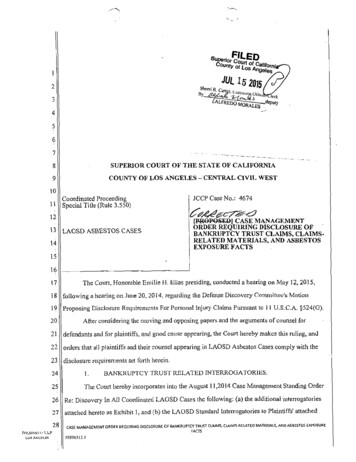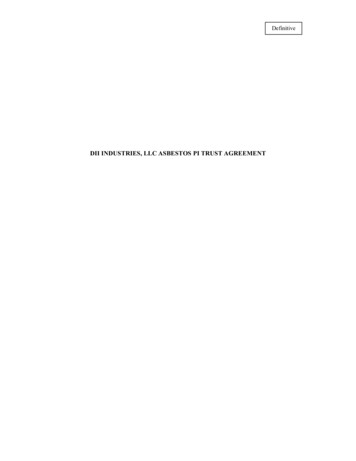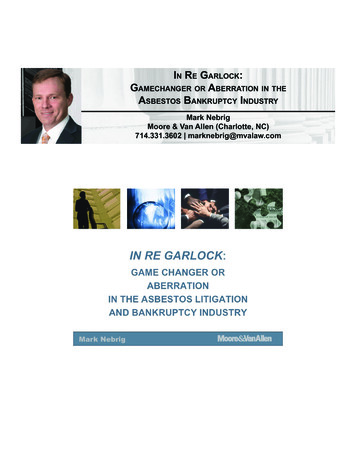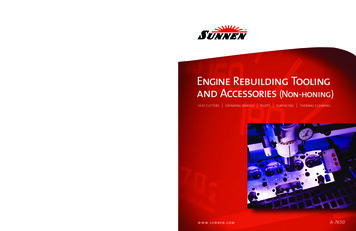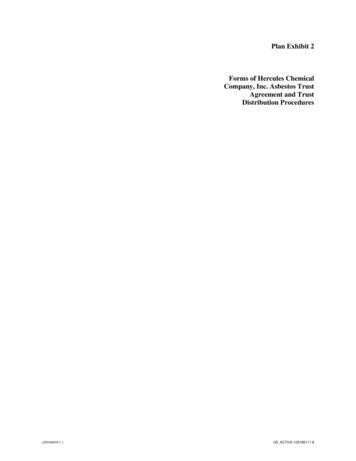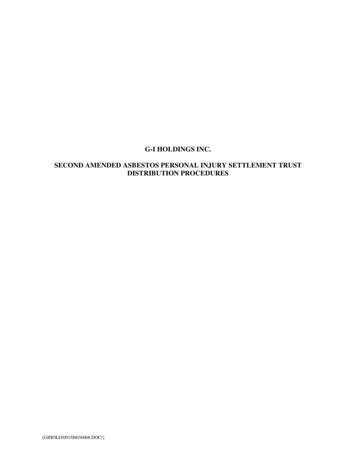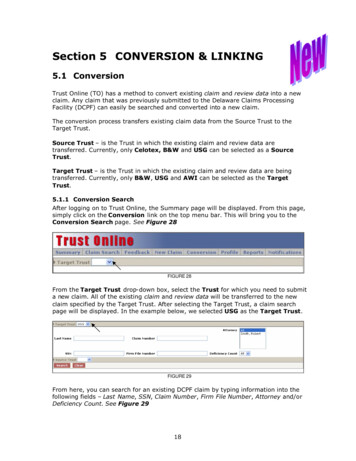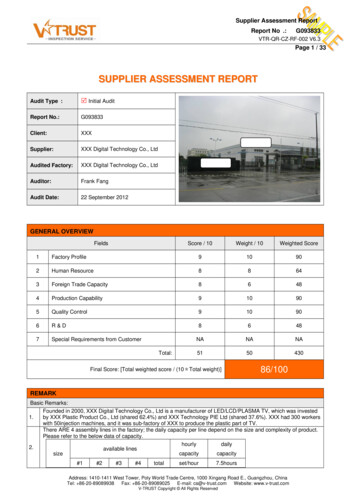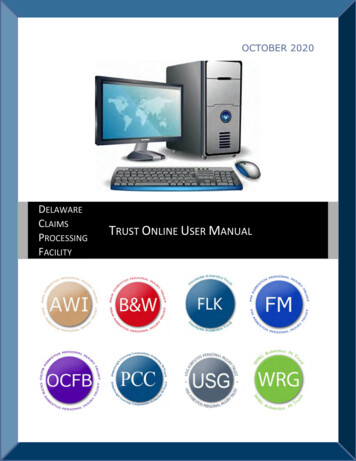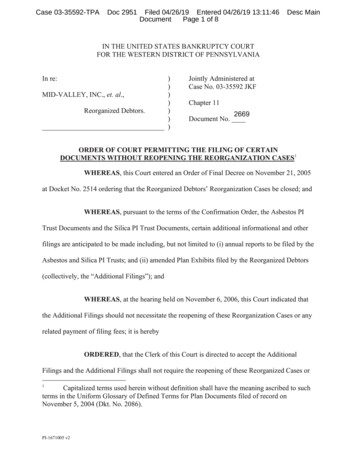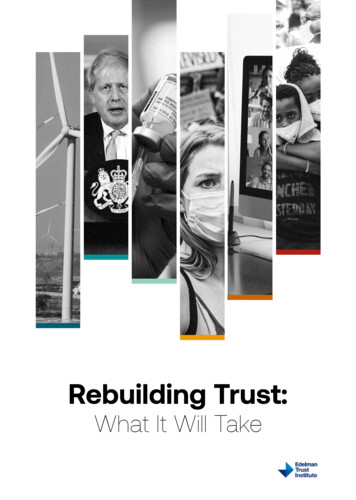
Transcription
Rebuilding Trust:What It Will Take
Table of ContentsAcknowledgements04Rebuilding Trust: What It Will Take08Credits for Cover Images, from the left: Jerry Zhang via UnsplashWPA POOL/Getty Image News via Getty ImagesContributor/Picture Alliance via Getty ImagesEdrece Stansberry via UnsplashAlistair Berg/DigitalVision via Getty ImagesNechirwan Kavian via UnsplashSpecial thanks to the followingfor their support of this publication:Publication Editor: Matthew BishopPublication Advisor: Rik KirklandYou Are What You Do, Not What You SayAn Interview with PayPal’s Dan SchulmanInclusive Leaders You Can TrustJune SarpongBuilding Trust at WorkKevin J. DelaneyJustin BlakeCaitlin SemoSusannah FerrisEdelman Intellectual Property TeamEdelman Design: Camila Gutierrez Patrick MadisonEdelman Global Marketing: Vanessa PymblePolly MingledorffRyann GastwirthPamela BlandonMichael Bush20262021 in Review:The Edelman Trust Barometer32Calling Business to Account on Climate34Edelman Trust Institute: 14Natasha Landell-MillsNGOs and the Future of TrustLysa John/Mandeep TiwanaTrust Me, I’m a JournalistSharon MoshaviA Time for Humble GovernmentsJuha Leppänen4046523Rebuilding Trust: What It Will Take /Matthew Bishop
Juha LeppänenKevin J. DelaneyMandeep TiwanaPresident & CEO, PayPalChief Executive Officer,Demos HelsinkiCEO and editor-in-chief, CharterChief Programmes Officer,CIVICUSDan Schulman is focused on democratizing and transforming financial services and e-commerce to improvethe financial health of billions of people, families andbusinesses around the world. With extensive experience in payments and mobile technology, Dan is leading PayPal to reimagine how people move and managemoney, and how merchants and consumers interactand transact. Under Dan’s leadership, PayPal has beennamed as one of the top companies on JUST Capitaland Forbes’ JUST 100 list, featuring “companies doingright by America.” PayPal has also been recognized asa Fortune Change the World company for its work totackle the biggest challenges facing society today.Dan has been recognized as one of Fortune’s top20 Businesspersons of the Year, one of Glassdoor’s Top50 CEOs, and a Ripple of Hope laureate by the RobertF. Kennedy Human Rights organization. In 2021, Danwas ranked third on Fortune’s list of the World’s Greatest Leaders, an honor that recognized individuals fortheir leadership throughout the COVID-19 pandemic. He is also the recipient of the Frederick DouglassAward presented by The New York Urban League, theVoices of Solidarity Award presented by Vital Voices,Endeavor Global’s High-Impact Leader of the YearAward, and a Brennan Legacy Award. Prior to PayPal,Dan served in leadership roles at American Express,Sprint Nextel Corporation, Priceline Group, and AT&T.He is a life member of the Council on Foreign Relationsand currently co-chairs the World Economic Forum’sSteering Committee to promote global financial inclusion. Dan earned a BA from Middlebury College andan MBA from New York University’s Leonard N. SternSchool of Business. He is also an avid mixed martialarts practitioner.With a mandate to build a fair, sustainable andjoyful next era, Juha helps national and local governments, businesses and NGOs to anticipate andlead societal transformation.Charter is a media and services company focused onthe future of work. Kevin was a co-founder of Quartz,managing editor at The Wall Street Journal, and senior editor at The New York Times.June SarpongLysa JohnBroadcaster and AuthorSecretary General, CIVICUSJune Sarpong OBE is the BBC’s Director of CreativeDiversity and author of “Diversify – Six Degrees of Integration” and “The Power of Privilege – How WhitePeople Can Challenge Racism,” both published byHarperCollins.Born in India, Lysa has championed human rightsand international mobilisation for two decades. Shestarted her career working for grassroots organisationsfighting to end urban poverty, and spearheaded largescale campaigns calling for government accountabilityto the Millennium Development Goals. Before joiningCIVICUS, she worked as Global Campaigns Director atSave the Children, and as Head of Outreach for the UNpanel that drafted the blueprint for the Sustainable Development Goals.A human rights lawyer by training, Mandeep specialises in legislation relating to the core civil society freedoms of expression, association andpeaceful assembly. He is passionate about improving civil society’s participation in decisionmaking, and has written extensively on the intersection between civil society, sustainable development and international affairs. Previously,Mandeep advised the International Committee ofthe Red Cross in New Delhi. He has also workedwith the Commonwealth Human Rights Initiativewhere he helped develop human rights modulesfor Commonwealth Parliamentarians and co-authored a citizens’ handbook on human rightscommissions in India.Presently Mandeep oversees CIVICUS’s workon defending civic freedoms and promoting democratic values while leading organisational engagement at the UN headquarters in New York.5Rebuilding Trust: What It Will Take /Rebuilding Trust: What It Will Take /4Dan Schulman
Rik KirklandWriter and EditorMatthew BishopPartner and Head of Stewardship,Sarasin & Partners LLPJournalist and innovatorRebuilding Trust: What It Will Take /6Matthew spent 25 years as an editor and writer at The Economist, including as businesseditor and New York Bureau Chief. He alsolaunched and moderated several Economistconferences, including on Fintech, the Futureof Work, and Investing for Impact. He then ledthe Rockefeller Foundation's Bellagio Center,convening global experts to develop practicalsolutions to some of the world's most urgentchallenges. He is currently a Non-ResidentSenior Fellow at the Brookings Institution.He has authored several books, includingPhilanthrocapitalism; The Road From Ruin;and Economics A To Z. A sought after speaker, media commentator and advisor, he hasinterviewed/moderated many leaders frompolitics, business and entertainment. He is acofounder of the Social Progress Index, #givingtuesday and 17 Rooms. He was honoredby the World Economic Forum as a YoungGlobal Leader. He served on the Sykes Inquiry on Restoring Trust in the InvestmentSystem and on the G8 Taskforce on SocialImpact Investing.Natasha joined Sarasin & Partners in 2013, where sheoversees the firm’s stewardship activities. Specific areasof work include steering the integration of environmental, social and governance (ESG) matters into the investment process, managing voting and engagement, andleading outreach on several policy and market-relatedmatters.Natasha is also currently a member of the FinancialReporting Council’s Investor Advisory Group; sits on theConsultative Advisory Group at the International Auditand Assurance Board as an investor representative; is anon-executive director at the policy-think tank CarbonTracker; and sits on the Investment Committee at theCambridge Universities’ Assistants’ Contributory Pension Scheme.Natasha has a background in development economics and responsible investment. Prior to joining Sarasin &Partners, she spent six years as the senior analyst leadingESG integration and several areas of policy work at theUniversities Superannuation Scheme’s investment management arm.Natasha has a Masters in Economics from the University of Cambridge, an MSc in Natural Resource and Environmental Economics from University College London,and is a CFA Charterholder.Sharon MoshaviPresident, the International Centerfor Journalists (ICFJ)The International Center for Journalists empowers an unparalleled global network of journalists to produce newsreports that lead to better governments, stronger economies, more vibrant societies and healthier lives.Moshavi, who previously served as ICFJ’s senior vicepresident of new initiatives, is a former internationalcorrespondent who has worked to advance journalismglobally for nearly two decades.7Rebuilding Trust: What It Will Take /NatashaLandell-MillsRik is a leader in business publishing. As Director of Publishing, he led McKinsey & Company’s global print and online activities from 2008 to June2020, growing its audience fivefold. From 2000-2005, Rik was the editor ofFORTUNE magazine, which under his leadership was three times nominatedas a finalist for general excellence by the American Society of Magazine Editors and won numerous other awards. Previously he served as FORTUNE’sWashington editor, Europe editor, International editor and Deputy Editor. Amember of the Council on Foreign Relations, he has been a frequent gueston CNN and CNBC and a moderator at the WEF in Davos, FORTUNE’s GlobalForum, Bloomberg’s New Economy Forum and the Microsoft CEO Summit.Currently Rik works with select clients on editorial priorities and serves asan advisor to McKinsey and the Edelman Trust Institute, on the board of theInternational Center for Journalists and plays in a rock band, The Prowlers.
Photo by Sandra Seitamaa on UnsplashRebuilding Trust:What It Will TakeLeaders and organizations can regain thetrust lost during the pandemic. But theymust move from insight to action if theworld is to emerge from this crisis betterequipped to handle the next one.The new year began with the Omicron variantseemingly everywhere. Yet there are still good rea-Matthew Bishopsons to hope that in 2022 much of the world will movedecisively into post-pandemic mode. If so, expect a “newnormal,” different from the old normal we left behind inearly 2020. How different, exactly? Much will depend onwhether, and in what ways, we can rebuild that essentialfoundation of modern living: Trust.“We were born to trust, but we were born to trustonly a few. Over the centuries, we have developed theinstincts and tools and institutions to expand our circleof trust to millions,” writes economist Benjamin Ho inhis timely new book, “Why Trust Matters.” In it, he argues that this long expansion of trust has been crucial toour growing prosperity and human progress. COVID-19provided an unprecedented global stress test of thosesupposedly trust-enhancing instincts, tools, and institutions. Sadly, the crisis revealed many of them werewanting— from our governments and their leaders andthe social contracts between the rich and the rest ofus to the media and social media, and the networks ofexperts meant to guide public thinking on everythingfrom medical science to economics.The pandemic also challenged how we saw eventhose few fellow humans we were born to trust— ourfamilies and neighbors, doctors, teachers, co-workers, and others, whose hugs or handshakes suddenlybecame a potential death sentence. Nonetheless,it was bubbles and pods of the few that most of ustrusted for support in getting through the physicaland mental ordeal of the past couple of years. Making sense of this simultaneous deepening of trustwithin our immediate circles and weakening of trustin those outside them is certain to be a big theme ofpost-pandemic life.What will it take to rebuild trust, or preferably,given that declining trust is an issue that long predates the pandemic, to build trust back better? Thatis the focus of this first collection of essays from thenew Edelman Trust Institute. On topics ranging fromgovernment and work to racial inclusion and climatechange, our writers describe the significant challenges ahead and offer practical ideas for buildingtrust in 2022, while making it clear that failure to dothe right things could have very bad consequencesfor our world.Rebuilding Trust: What It Will Take /9Rebuilding Trust: What It Will Take /8
Towards Trustworthy GovernmentEarly in the pandemic, the 2020 Edelman Trust Barometer Spring Update: Trust and the COVID-19 Pandemicreported a surge of trust in government. As I predicted back then, this proved to be a short-lived “trustbubble”, probably owing more to the desperate hopethat governments would deliver than to any genuinetrust that they would. And indeed such hope in mostcountries quickly vanished as the death toll mounted.By January 2021, the Edelman Trust Barometer foundthat around the world, governments generally wereless trusted than both business and NGOs, thoughthey were still slightly more trusted than the media(see 2021 in Review: Edelman Trust Barometer). Amajority of those surveyed believed that governmentis neither ethical nor competent (while, as they alsobelieved, business, uniquely, is both).“Make sure what you say and what you do arealways aligned”, says Dan Schulman, PayPal’s President and CEO, in his interview with Rik Kirkland. Thatis surely the first law of trust building. Hypocrisy is atrust destroyer, one in which those running the British government’s response to COVID-19 have led theworld— delivering a series of embarrassing breachesof their own rules, from driving long distances unnecessarily and love affairs conducted outside approvedpods of contacts, to Downing Street throwing an office “Christmas party” during a national lockdown.Yet Boris Johnson and team are hardly alone in this;even Sanna Marin, the usually sure-footed prime minister of Finland, was caught nightclubbing when sheshould have been quarantining.Incompetence is another trust destroyer— andwhile debate is likely to continue for years about howwell or (mostly) poorly different governments performed during the pandemic, and at different stagesof it, two years in, even those that performed well initially are losing their sheen. For instance, the popularity of New Zealand’s prime minister, Jacinda Ardern,has been falling lately, despite a miniscule COVID-19death rate in the country, as frustration with lockdowns has coincided with the worst outbreak sincethe start of the pandemic.That Difficult Return to the OfficeFor many of us, the most significant act of new normalization in 2022 will be returning to the office. As KevinDelaney argues, there is every chance that employerswill botch this transition, not least by failing to allowflexibility and autonomy to workers who feel they nowdeserve the trust of their bosses, having so diligentlyworked remotely during the pandemic. We may nowsuffer from zoom fatigue, but few of us want to returnto the grind of the old five-day schedule of breakfastmeetings, rush hours and so on. According to the 2021Edelman Trust Barometer, workers currently trust “myemployer” more than they trust any other institution.But that could change fast if employers do not reciprocate that trust and instead attempt to enforce an inflexible policy of “turn up at the office or you’re fired.”Far better that bosses act with emotional intelligenceand truly engage with their employees to get the remote versus office balance right.Bosses will also have their hands full in 2022 building trust with minority employees and customers onworkplace inclusion, and with all of us, on their pledges to fight climate change. June Sarpong outlinessix practical priorities for would-be inclusive leaders,whilst Natasha Landell-Mills argues that all the recententhusiasm of company bosses for pledging to maketheir firm a “net zero” emitter of carbon will add up to,well, absolute zero if these pledges do not come withan action plan and a set of accounts that truly reflectthe financial implications of tackling climate change—which, for many people, may this year replace the pandemic as the most pressing global challenge.Ending the InfodemicEven the world’s most famous optimist, Bill Gates,fears that in 2022, “decreased trust in institutionsmight be the biggest obstacle standing in our way.”For this, he pins much of the blame on growing polarization, driven not least by social media, which “hasplayed a huge role in spreading misinformation thatmakes people suspicious about their governments.”And it is not just governments that are being hitby this so-called “Infodemic.” Gates himself has beenat the center of one wild conspiracy theory popularamong anti-vaxxers as they spread misinformationabout medical science. The creation and rapid deployment of vaccines against COVID-19 is a truly remarkable achievement, so the refusal of so manypeople around the world to get vaccinated is perhapsthe clearest indicator we have of the severity of thecurrent trust crisis.11Rebuilding Trust: What It Will Take / Newsday LLC/Newsday via Getty ImagesRebuilding Trust: What It Will Take /10Perhaps it is simply too hard for any governmentto consistently get the answers right when tackling ahorrendously complex challenge such as a pandemic, one that requires the right balance to be struckbetween often competing demands from the publicfor effective health care, economic prosperity andpersonal freedoms. The time may have come, as JuhaLeppanen argues, for more “humble” governments.Instead of claiming— and being expected—- to haveall the answers, policymakers, he suggests, should behonest about their limitations and prioritize collaboration with others, including political opponents, tosolve the biggest problems.Some of that humility and collaborative spirit willalso be needed to make the world’s multilateral governance institutions trustworthy. The rapid spread ofthe COVID-19 virus was, in part, a direct consequenceof our previously having been too trusting in the international system, as we allowed the barriers betweenus to be torn down without putting in place the detection mechanisms and other protections that couldhave stopped the melting pot of globalization frombecoming a hyper-efficient system of deadly diseasetransmission. The World Health Organization hasstruggled to fulfil its role, not helped as the pandemictook off by both (temporary) hostility from the UnitedStates and a lack of transparency from China.A major effort will be needed to create a high-performing international system, capable of dealing better not just with potential future pandemics but otherlooming global disasters, from climate change torising geopolitical tensions such as between the USAand China. The failure of richer countries to supplyanywhere near enough vaccines and financial supportto the world’s devastated poorer countries further reduced those countries’ trust in the fairness of the international system. This will make it even harder to reachconsensus on crucial global reforms, as was painfullyclear during the recent COP26 climate change talks.Doing something quickly to begin rebuilding this trustbetween nations should be a high priority, especiallyfor rich country governments, in 2022.
No one said rebuilding trustwould be easy. But it shouldbe at the top of everyone’sagenda in 2022. Andrea Verdelli/Getty Images News via Getty ImagesRebuilding Trust: What It Will Take /Rebuilding Trust: What It Will Take /13 Chinese president Xi Jinping on video at the Museum of the Communist Party of China”12Trust in the mainstream media has also been weakened through misinformation attacks— though Sharon Moshavi has some good ideas for how journalistic organizations can fight back. So too have NGOs,which Lysa John and Mandeep Tiwana believe shouldhave experienced rising trust due to their heroic workduring the pandemic yet have been hurt by lies spreadby populist politicians who want to weaken civil society. They call on civil society organizations to makemore use of social media and other communicationstools to build trust.Unfortunately, building trust with one group by undermining trust in another seems to be far easier todaythan building trust in inclusive ways that bring everyone closer together— though it is the latter that theworld needs in 2022. Nor is it obvious what to do aboutthe tendency of social media to isolate people in information bubbles that reinforce their own biases andprejudices and increase their over-confidence in beingright. On this, even Gates admits, perhaps for the firsttime in his life, “The truth is, I don’t have the answers.”No one said rebuilding trust would be easy. Butit should be at the top of everyone’s agenda in 2022.Perhaps some innovations will help. The blockchainmay start to live up to its theoretical promise as a“trust engine.” Old ideas may find new relevance, too.In his book, Ho argues for more use of apologies tobuild trust— especially sincere apologies that come atsome personal cost. Ultimately, trust will come to thetrustworthy. PayPal’s Schulman is right: The crucialthing is for our words and actions to be aligned.Hopefully, these essays will stimulate further conversation about how trust can be rebuilt this year—and may even provide an actionable idea or two foryour own efforts at building trust. Matthew Bishop spent 25 years as an editor and writer at The Economist, including asbusiness editor and New York Bureau Chief, and is a Non-Resident Senior Fellow at theBrookings Institution. He cofounded the Social Progress Index.
Office of the United Nations Secretary-General Special Advocate for the Inclusive Finance for Development“You Are What YouDo, Not What YouSay:” How to KeepTrust at the Top of theCEO Agenda Schulman delivers remarks on the importance of technology for inclusivefinance at the 74th UN General Assembly in New York City in September 2019”Since Dan Schulman became President and CEO of PayPal in September 2014, the onlinepayments company and its leader have delivered a performance for the ages. Since PayPal went public in July 2015, revenues have nearly tripled as transaction volumes climbedfourfold, which has in turn delivered significant long-term value creation to stockholders.Looking back, Schulman has no doubt that trust-building has been at the heart of PayPal’ssuccess. In this interview with Rik Kirkland, former managing editor of Fortune, Schulmanreflects on what it takes for businesses to earn trust— and why doing so is going to matterDan Schulman in conversation with Rik Kirklandmore than ever. (PayPal is an Edelman client.)Rebuilding Trust: What It Will Take /15Rebuilding Trust: What It Will Take /14
RK: Does earning trust for abusiness today require more thansimply offering reliability and productsthat deliver good value?DS: Trust extends well beyond whether you deliver anexcellent product or service. Doing that is very necessary, but it’s not sufficient. To be a company that embodies trust, your mission and values should makeit clear that you stand for more than just maximizingprofit. That you stand up for social issues that are important, and you do the right things to help create abetter world. I really believe companies can’t think ofthemselves as separate and distinct from the communities they operate in.To be a company thatembodies trust, your missionand values should make itclear that you stand for morethan just maximizing profit.The reason is, if I can attract and retain great employees, a passionate, diverse workforce who believe inwhat we are doing, then nobody will work harder or execute better against PayPal’s mission. And that is goingto give me all the competitive advantage that I need.That said, all stakeholders matter. A lot of techcompanies aren’t trusted because people don’t understand how they work. At PayPal we launch no product or service without regulatory consultation. When Ifirst came here, we had about 100 compliance and financial crimes related staff. Today we have more than4,000. You might say, “Wow, that must stop you frominnovating .” But I consider it a competitive advantage.Because when we launch a new product with thebacking of regulators, consumers can trust it as well.RK: Does a more digital world put ahigher premium on trust?DS: Digitization is making us all more vulnerable topeople we don’t really know. People know their information is “out there,” regardless of whether it’s packaged or sold on the dark web. The world is ever moreprone to cyberattacks. As a result, people are feelingvery vulnerable. They are looking for safety, rocks in ashifting landscape that they can count on.But the older I’ve gotten and the longer I’ve been inCEO jobs, the more I’ve realized that if mission andvalues are what guide your toughest decisions, it’snot actually that hard. When North Carolina passeda bathroom law in 2016 that discriminated againstLGBTQ citizens, I immediately made the decision thatwe were going to withdraw our plans to open an operations center there in a week. Because that was aclear assault against people for their gender identityand their sexual orientation. Now, I didn’t realize howmuch it was going to thrust us into the national spotlight, that I couldn’t go into a bathroom for a whilewithout security searching the stalls first. But it wasclear to me that this was a case of putting our valuesinto action, and honestly, we had no choice but tomake that decision.17Rebuilding Trust: What It Will Take /Rebuilding Trust: What It Will Take /16Dan Schulman: First, understand that trust can onlybe built over time. A company can’t just look up andsay, “Hey, we want to be trusted.” Today, PayPal regularly shows up at the top of various lists of the world’smost trusted brands. But a lot of what we did to support that goes back six or seven years. You have tothink longer term than the next few quarters.Second, be consistent. For a brand, that requires aclear mission that sets out what you’re about; a clearset of values to support that mission; and articulatingboth clearly, internally and publicly. Above all— thisis incredibly important— it requires acting on thosevalues. Saying that you have values and not actingon them is worse than not having any values. That’swhat causes employees to revolt, that’s how you sowdistrust with customers or regulators. My dad told me,“You are what you do, not what you say.” Make surewhat you say and what you do are always aligned.by supporting Black-owned small businesses and creating an economic opportunity fund to invest in community banks and credit unions serving underrepresented communities.Some is about things you stop doing. For example,we’ve barred hate groups, the Proud Boys on the farright and Antifa on the far left, from using our platform.The difficult part there is identifying what is hatred andwhat is freedom of speech. Nobody teaches you that. Omaha World HeraldRik Kirkland: Trust is declining across somany countries and institutions thesedays. How can organizations move thatneedle in the right direction?RK: How can trust serve as a guide tomanaging the conflicting demands ofdiverse stakeholders?RK: For example . . .DS: Some is about the things you do. We’ve taken alot of positive stands: backing immigration reform;providing access to interest-free loans to help federalworkers when they were furloughed during the government shutdown in 2019; and investing more than 500 million since 2020 to close the racial wealth gapDS: That companies operate in a world of stakeholder capitalism has to me always been a full no-brainer.It’s also clear that while I serve at least five differentconstituencies— employees, customers, communities, shareholders, regulators— my number one constituency is my employees. And I’ll say that in front ofany shareholder. Schulman in Omaha, Nebraska after announcing a new "employeefinancial wellness initiative" that put more money in workers pockets
Bloomberg New Economy ForumWhat they really care about is: Is a brand secure anddoes it protect my privacy? For PayPal, security andprivacy are the two pillars we rest on. Transparencyis also critical. Products should be simple to use andeasy to understand. No surprises, no fine print. Yourbusiness model shouldn’t rely on people not havingall the facts, or pricing that’s not clear.RK: Trust in autonomous systemsand distrust in fiat currencies are partof the explosive rise of crypto andblockchain technologies. How do yousee those forces playing out?19Rebuilding Trust: What It Will Take /Rebuilding Trust: What It Will Take /18DS: People misunderstand or conflate various partsof the complex debate over crypto, digital currenciesand blockchain. Yes, there is a set of people who believe some form of cryptocurrency should be out ofthe hands of government and disintermediate everybody. But I strongly believe there is no way that theworld’s financial system is not going to be regulatedby governments. That system’s stability and integrity is just too important. Yes, a lot of people get hungup on the price of Bitcoin and whether it’s in a bubble. I think we should have the humility and courageto admit that we’re in the early stages, and we don’tknow perfectly what the future is going to hold.But none of that means we shouldn’t explore theopportunity now to innovate responsibly. The core ofPayPal’s mission is to make sure people aren’t left behind or left out when it comes to the financial system.The current system is antiquated, inefficient, expensive, and exclusive. Those are facts. And pretty muchevery regulator and central banker agrees.If I had to predict, I think what’s going to happen withcrypto is that it will become an enhanced utility forpayments. That involves things like the ability to createprogrammable money, which uses software and newtechnology to take payments to a different level. Youcan embed compliance in a payment, you can embedidentity. This all goes well beyond what we can dotoday. You can digitize assets by creating non-fungibletokens or take pieces of asset classes that could neverbe available to the masses and decompose them inways that make them more affordable.What all these ideas do is use the underlying distributed ledger technology to make the system moreefficient and, where it makes sense, disintermediate Schulman participating in a panel session at the Bloomberg New Economy Forum in Singapore in November 2021where he discussed pandemic recovery efforts and the ways in which we can collectively ensure a more inclusive futureRK: Looking ahead, will trust stay at thetop of the corporate agenda?unnecessary intermediaries. If I’m sending an international remittance from one digital wallet to another digital wallet, why go through four o
the Red Cross in New Delhi. He has also worked with the Commonwealth Human Rights Initiative where he helped develop human rights modules for Commonwealth Parliamentarians and co-au-thored a citizens’ handbook on human rights commissions in India. Presently Mandeep oversees CIVI
